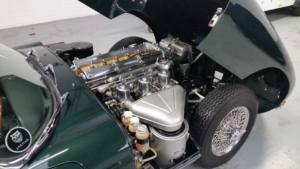Understanding Engine Detailing
What is Engine Detailing?
Engine detailing is a deep clean for your car’s engine. It removes dirt, oil, and grime. This helps your engine look and work like new. It’s not just a tidy-up; it’s preventive care for your car. Think of it as a spa treatment for the engine. It ensures top performance and safety. In the UK, engine detailing can protect against elements. It’s a key step in maintaining your vehicle’s health and value
Benefits of Engine Detailing for Performance and Safety
Engine detailing isn’t just for show; it’s a key part of car care with real benefits. Here are some key points:
- Boosts Engine Performance: A clean engine runs smoother, ensuring maximum power and efficiency.
- Prevents Overheating: Dirt and grime trap heat. Cleaning helps maintain ideal engine temperature.
- Detects Problems Early: Regular cleaning makes it easier to spot issues like leaks or wear.
- Enhances Safety: A well-maintained engine is less likely to fail, keeping you safe on the road.
By focusing on routine engine detailing, UK car owners can enjoy a more reliable, safe drive.
The Importance of Engine Detailing for UK Car Owners
Weather Considerations in the UK
In the UK, the weather can greatly affect car engines. Frequent rain and cold can lead to rust and corrosion. This can harm engine parts and lower performance. Humidity also brings dirt and grime. These particles can stick to engine components. Over time, this buildup can impact fuel efficiency and safety. Engine detailing can protect against these problems. It makes sure the engine stays clean and dry. This helps avoid costly repairs. Regular engine detailing supports a robust and healthy engine, despite the UK’s harsh weather.
Impact on Vehicle Longevity
In the UK, cars face unique challenges due to the climate. Frequent rain and humidity can lead to rust and corrosion. Not just that, road salt used in winter can also damage engine parts. These factors can shorten a car’s life. But with regular engine detailing, you can protect your engine. This care helps to remove harmful elements. And so, it can extend the life of your vehicle. That means less repair costs over time. It also keeps your car’s value high. By taking steps today, you can improve your car’s long-term health.
Step-by-Step Guide to Engine Detailing
Cleaning Techniques and Products
Embarking on engine detailing? Follow these tips for success. Start by choosing the right products. Opt for cleaners made for engines. It’s crucial they’re grease-cutting and safe for car parts. Use a soft brush for loose dirt. For tough grime, a harder brush works. Microfiber cloths are best for wiping surfaces. Avoid harsh chemicals that can harm the engine. Remember, gentle is key. Next, we’ll talk about degreasing your engine bay.
Degreasing the Engine Bay
Degreasing the engine bay is a key step in engine detailing. It’s how we remove built-up grease and grime that can harm the engine. Here is a simple guide:
- Prepare Your Materials: Gather a degreaser, brushes, and cloths.
- Cool Engine: Ensure the engine is cool to prevent injury and to allow the degreaser to work effectively.
- Protect Components: Cover sensitive parts like the alternator and air intake.
- Apply Degreaser: Spray the degreaser on greasy spots. Let it soak in for a few minutes.
- Scrub Away Grime: Use brushes to scrub parts. Be thorough but gentle.
- Rinse Carefully: Gently rinse with water, avoiding electrical parts.
- Dry and Inspect: Wipe down the engine bay. Check for any missed spots.
Detailing for Optimal Performance
A clean engine is not just pleasing to the eye – it’s critical for performance. Here are key steps for top results:
- Start with a Cool Engine: Heat can pose dangers when cleaning. Always let your engine cool before you begin.
- Remove Loose Debris: Use a brush or compressed air. This step stops dirt from mixing with your cleaning products.
- Pick the Right Cleaner: Select a product made for engines to avoid damage.
- Gentle Scrubbing: Use a soft brush to lift grime without harming engine parts.
- Rinse Carefully: Avoid electrical parts. A low-pressure stream of water works best.
- Dry Thoroughly: Leave no water behind. Use a microfiber cloth or let it air dry.
- Protective Coatings: Apply protectants to shield against rust and dirt.
For the best engine health, it’s essential to clean slowly and with the right tools. This keeps your car running smoothly and efficiently.
The Role of Engine Detailing in Vehicle Maintenance
Preventive Measures to Avoid Engine Issues
Engine detailing is not just about looks; it’s a key part of vehicle upkeep. Dirt can harm an engine. It may cause overheating and wear. Regular cleaning keeps parts visible for inspection. This makes spotting leaks or damage easier. It also helps parts last longer. Plus, a clean engine runs cooler, reducing strain. In essence, engine detailing can stop small issues from turning into big ones. Think of it as an investment in your car’s future.
How Often Should You Detail Your Engine?
Engine detailing is not just about keeping your car looking good. It’s a key part of maintenance. It should be done regularly to keep your vehicle in top shape. But how often is best? For UK cars, experts suggest every 3 to 6 months. This helps to prevent dirt build-up and rust, common due to the UK’s wet weather. Regular detailing keeps your engine running smoothly. It also spots any issues early on. Stick to a schedule. Your car will thank you with better performance and a longer life.
Professional vs DIY Engine Detailing
When to Seek Professional Detailing Services
Determining when to call on professionals for engine detailing can be crucial. Here are signs it’s time for a pro service:
- Complex mechanical knowledge needed: If you’re not well-versed in car mechanics, professional help is wise.
- Lack of proper tools: Specialized tools are a must. Without them, opt for expert care.
- Time constraints: Busy schedules make DIY tough. Professionals save you time.
- Warranty concerns: Some car warranties require professional servicing. Check yours.
- Safety: If you’re unsure about handling chemicals or equipment, let the pros handle it.
Tips for DIY Enthusiasts
For those who dare to tackle engine detailing at home, here are some helpful tips:
- Start with the right tools. Gather basic items like brushes, microfiber towels, and a high-quality degreaser.
- Go slow and be thorough. Take your time to reach every nook and cranny of the engine bay.
- Protect electrical components. Cover sensors and electrical parts with plastic to avoid damage.
- Choose the right products. Use car-friendly cleaners that won’t corrode engine parts.
- Rinse carefully. When hosing down your engine, use a gentle stream of water to avoid forceful water intrusion.
- Dry the engine bay. Once cleaned, ensure the area is completely dry to prevent rust and corrosion.
- Regularly maintain. Keep up with engine detailing to prevent build-up and prolong your car’s life.
These tips give DIY enthusiasts in the UK the confidence to detail their engines safely and effectively.
Enhancing Vehicle Value with Engine Detailing
Resale Benefits of a Well-Maintained Engine
A clean engine boosts a car’s value. If you sell, buyers will notice. They’ll see you cared for the car. A detailed engine suggests a well-maintained vehicle. This can lead to better offers. People often judge a car by its looks. A shiny engine can say a lot. Plus, dealers may give you more trade-in value. In short, engine detailing can mean more money for you.
First Impressions: The Aesthetic Advantage
A gleaming engine can be a deal maker. When someone lifts the hood, a clean engine speaks volumes. It shows care and can boost a car’s value. In the UK car market, first looks matter. A well-detailed engine sets your car apart. It can sway buyer choices. A tidy engine bay could seal the deal. Investing in the look of your engine is wise. It pays off at resale time. Clean engines impress and sell cars faster. Make sure yours shines.
Engine Detailing and Environmental Responsibility
Using Eco-Friendly Products
Engine detailing can be greener. When caring for engines, opting for eco-friendly products matters. These products are kind to nature and just effective. They contain fewer chemicals that may harm the environment. Look for cleaners with biodegradable ingredients. Avoid harsh solvents that can contaminate soil and water. Some brands focus on green car care solutions. They offer plant-based cleaning agents. Always read labels for any hazardous warnings. Small changes can lead to big impacts for our planet. Choose eco-friendly for your car’s heart and the environment’s health.
Preventing Chemical Runoff
Engine detailing involves using chemicals. These can harm our environment. It’s critical to prevent chemical runoff. Runoff can affect soil and water quality. This puts wildlife at risk. Simple steps can reduce this harm. Use eco-friendly cleaners. Cover ground drains during detailing. Collect waste water properly. Dispose of chemicals at designated sites. Following these steps helps protect nature. It ensures we enjoy our cars without harming the planet.
Safety Practices for Engine Detailing
Personal Protective Equipment
When tackling engine detailing, safety comes first. Personal protective equipment (PPE) is vital. Here’s a list of PPE every UK car owner should wear during this task:
- Gloves: Protect your hands from chemicals and sharp edges.
- Goggles: Shield your eyes from splashes and debris.
- Respiratory mask: Filters out harmful fumes and dust particles.
- Apron or coveralls: Keep your clothes free from stains and chemicals.
Using these items will help reduce risks and keep you safe while you work on your car’s engine.
Safe Disposal of Waste Products
When detailing your engine, you will use various products that can harm the environment. It’s vital to dispose of these waste products safely and responsibly. Here’s a simple guide to help:
- Drain oil and fluids into a sealable container. Take them to a recycling centre.
- Put oily rags in a metal bin. This reduces the risk of fire.
- Recycle aerosol cans once they are empty.
- Never pour chemicals on the ground or into drains.
By following these steps, you protect the planet and comply with UK laws.



